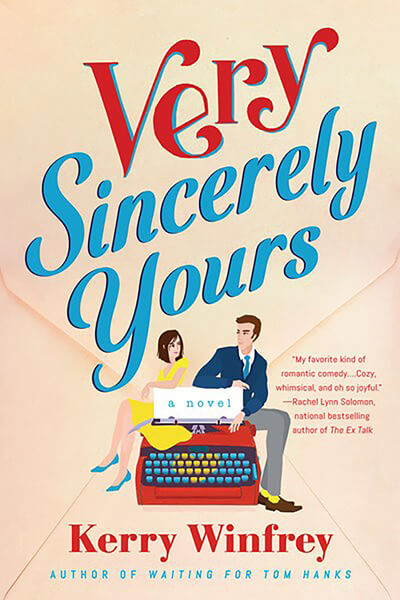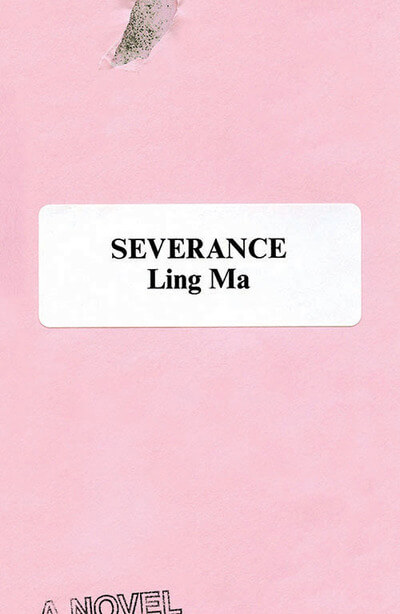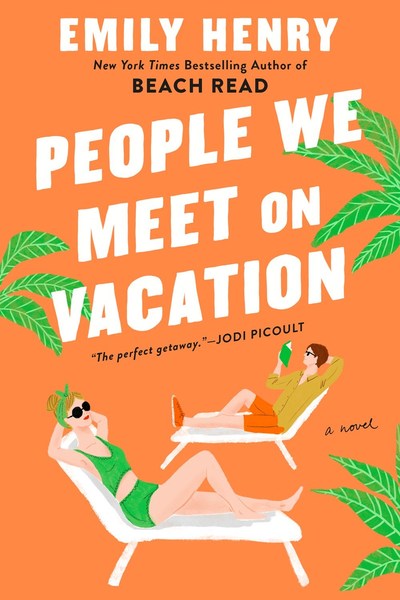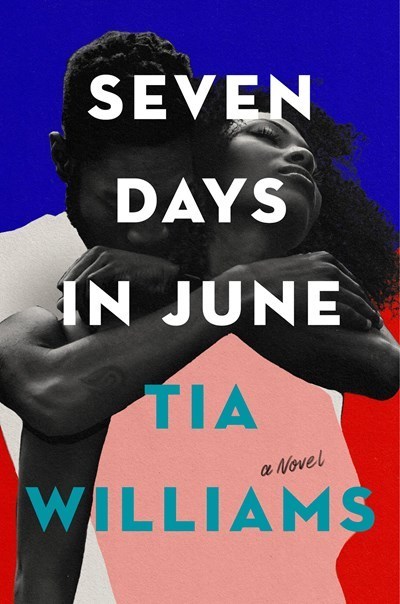The epic on-again, off-again love story of actor Whitman “Win” Tagore and wealthy playboy Leo Milanowski is beloved by tabloids and Twitter users alike. Too bad none of it is real. Mikaella Clements and Onjuli Datta, the Berlin-based married couple who wrote The View Was Exhausting, took BookPage behind the scenes of their jet-setting new romance.
Can you tell us about the premise of The View Was Exhausting? Where did the idea for this novel originate?
It began in the summer of 2016, when pop culture gossip seemed to be particularly packed with celebrity romances. A big question and suspicion in the media was whether or not these relationships were real or whether they were there to drum up attention. But rather than speculating on what was real and what wasn’t, we wanted to say, “OK, it isn’t real. What’s that like?” We wanted to delve into the emotion and intimacy of that kind of fake relationship, as well as how it would feel to orchestrate your own summer romance.
Fake dating has always been one of our favorite romance tropes, and in this context it seemed like a great opportunity to combine it with another favorite trope: best friends falling in love! Along with that, we were interested in the way a massive celebrity story might share smaller and more intimate truths about people and relationships.
The book takes place in a rarefied world of jet-setting playboys and A-list Hollywood stars, but through Whitman’s experiences, it also explores what it’s like being a woman of color in that male-dominated world. How did you approach this story? Is it grounded in fantasy, research, personal experience or a combination of all three?
Realistically, all of our gleeful consumption of pop culture in the decades before writing this counted as research. In terms of actual research into celebrity culture, we weren’t so concerned with technical authenticity and logistics. We just don’t care that much about how a yacht party actually works or how to conduct a photoshoot in a rented castle, and we’re not very worried about misrepresenting that side of things. Famous people will just have to live with our misguided ideas!
Instead, we were invested in two things: real emotions and vibes. We wondered how it would feel to be in that situation, under the limelight, obsessively monitored. We also wanted a deeply lush novel that you could dive right into. The celebrity backdrop gave us the aesthetic experience we wanted, and we had a very active and frequently updated mood board in our heads that fueled a lot of that creative thought. It felt more important that the novel feels hugely visual and claustrophobic at once, rather than getting bogged down in daily schedules and legal details.
If any luxury hotels want to take us on a belated research trip to St-Tropez to correct our ignorance, we will dutifully accept.
In terms of how we prepared to explore the sense of being a woman of color in a male-dominated world, we read very widely. There are lots of women of color working in the film industry now who speak very honestly and intelligently about their varied experiences, which we’re grateful for. We drew on interviews with and pieces from and about Constance Wu, Priyanka Chopra Jonas, Parminder Nagra and Viola Davis, among others—including men, like Utkarsh Ambudkar. And of course, we also drew on our own experiences of the world as a mixed-race couple. We worked on the assumption that women of color deal with similar obstacles, whether they’re famous or not. The same issues of being perceived and being exploited felt close to home.
"Do you owe your viewers authenticity or just really good content? How much do people want to see the truth, and how much do they just want to be entertained?"
Scandal, ruin and image management are fascinating topics, both in the world of celebrity media and within the genre of romance. In some ways the concepts seem quaint, and yet scrupulous reputation management is still mandatory for public figures. What made you take this on? Were you inspired more by real-world scandals or fiction about celebrities?
We were inspired by real-world scandals, particularly because of how relatable they felt. Scandal is obviously inherent to the celebrity domain, but reputation management feels like something that everyone in our generation and younger is concerned with now. Whether there’s 10 people or 10,000 reading your Twitter, you worry about how you’re coming across. In that sense it felt like a universal theme that we were interested in tackling.
We’re also really interested in the potential that image and reputation management offers, as something if not exactly positive, then not exactly negative either. There’s something fascinating and appealing about the idea of refashioning yourself, kick-starting a new identity. When we started writing The View Was Exhausting five years ago, the conversation around social media was very judgmental and misogynistic—it was the era of mocking Valley girls taking selfies—and we were interested in the idea of returning intelligence and ambition to the equation. Having a character who still ultimately sees social media as a trap but also as a tool—and attempts to find a balance between the two.
Another point of interest for us was the monetization of reputation, the way that image is so commercialized now and how it’s a legitimate form of celebrity to just be really good at crafting your self-image and making yourself aesthetically appealing. For us it became a moral question: Do you owe your viewers authenticity or just really good content? How much do people want to see the truth, and how much do they just want to be entertained?
A really useful influence when we were writing Win was Jia Tolentino’s essay “The Cult of the Difficult Woman” in her book, Trick Mirror. She talks about how appearing “badly” can sometimes be just as useful to a public figure as appearing well, something we drew on when working out how Win would react to public shifts in opinion.
"We wanted their relationship to feel like sneaking into the back of a party with your best friend, laughing as you pass a bottle of wine back and forth."
One of the many striking things about the novel is how specific and relatable Win is despite the glamour. We see her layers and how she acquired her gloss. Since the age of 20, Win has effectively tried to split herself into two, putting her complicated, angsty and unruly self behind her and putting forth the strategically immaculate image of Whitman Tagore, a professional actor who never loses control and never puts a foot wrong. How did you develop Win/Whitman?
We started, crucially, from her relationship with Leo. In terms of characterization, both Win and Leo began wrapped around each other—then they spiraled out from there. That meant that as writers, the first person we met was Win, because—for the most part!—that’s who she is with Leo. It felt like we had to start with the kernel of Win and then use that kernel to create a public and professional persona that was also true and also her, but just in a much more deliberate and constrictive way.
The history of Win’s ascent to fame and her relationship with celebrity was something that we came up with well after we’d sketched out Win’s character and figured out the relationship dynamics between her and Leo as well as other significant figures in her life. In some ways it was like filling in blanks, in others it was like adding layer upon layer onto her character, in the same way that Win herself lives her life as several different layers of Whitman Tagore.
Fake dating creates forced proximity that allows chemistry to take flight, but the flip side is that both Win and Leo are so adept at performing that their haircuts are strategized and tumbles in the sand are staged for maximum impact. With the question hanging over their relationship of what’s real between Win and Leo and what’s being put on for others, what ultimately makes them work as a couple?
We think it’s that they are best friends. There’s some instinctive thing that they understand about each other, some moment of recognition in that initial spark of their first meeting. They both stick out to each other as someone incredibly different from everyone else that they already know; it’s this weird happy amazement, like, oh my God, who is that!!!!
The moments of fun and glee between them were also really important. We wanted their relationship to feel like sneaking into the back of a party with your best friend, laughing as you pass a bottle of wine back and forth. There’s just a sense of sheer amazement about the other one for both of them: finding someone who knows you so well and is so fascinated by you all the same, like there’s always something new to learn, some new trick to pull, some new game to play.
 This is the first novel for both of you, but you’ve each published short stories and nonfiction before. Can you tell us a bit about your other writing and how this book evolved from the work you’ve done previously?
This is the first novel for both of you, but you’ve each published short stories and nonfiction before. Can you tell us a bit about your other writing and how this book evolved from the work you’ve done previously?
We’re quite slow writers, so we’ve been working on this novel for about five years, and the other writing developed alongside it rather than beforehand. We both really enjoy switching between genres and delving into different ideas. Because a novel is such a huge, time-consuming project and yet at the same time is dealing with a relatively limited subject, writing short stories and nonfiction was a way for us to explore other avenues or genres or concepts or characters who didn’t exactly fit in The View Was Exhausting—like horror, queer romance or dystopian worlds—without losing focus on the novel.
We both read widely, and neither of us are particularly disciplined writers. We always work best when we’re working on something we’re interested in at the moment. That means our writing can veer in different directions depending upon the flavor of the month. In fact, it was telling for us that we’d stumbled into a novel that was actually going to go somewhere when we never lost interest in The View Was Exhausting! Some threads that you’ll find in our short stories, nonfiction and the novel are: sunsets as existential terror, elaborate meals, kissing, an obsession with Middlemarch and Hemingway, fog wreathing around your ankles.
What is the writing process like for you, both as individuals and in terms of writing together? Do you divide the tasks in a particular way? How do you ensure continuity of voice when writing with a partner?
In terms of writing the novel, we start out by planning together. We might not always know exactly what’s going to happen all the way through to the end, but we each know just as far as the other does. There are no surprises. Then we take turns writing, sometimes stopping mid-scene and sometimes taking it all the way through to the end of a chapter.
After a long time spent co-writing, we’ve developed quite a shared voice, but beyond that, if Onjuli writes a scene, Mikaella will edit it heavily, and vice versa. We’re both big believers in multiple drafts, so by the time The View Was Exhausting went to our editor, we had both written and rewritten each scene four or five times each, to the point that each person’s writing really intertwines with and permeates the other’s. It’s difficult even for us to remember who wrote a particular sentence.
We try not to divide tasks, but there are definitely scenes or themes that each of us is individually drawn to. One of us might be thinking a lot about a particular idea and ask if they can have a crack at it first. Or on the other end of the scale, there might be a scene we know is going to be difficult, and one of us draws the short straw and has to give it the first shot. But at least then we can give up ownership immediately after finishing it and be like, OK, now you fix it!
Writing individually is obviously a different kettle of fish . . . but there are similarities, namely that the other person is always waiting in the wings to edit when required, if not reading along as we go!
Were there particular challenges or surprises that came with writing a love story with your spouse?
Honestly, our writing lives have been intertwined for as long as we’ve known each other (nearly a decade now). We’ve always written back and forth. When we first met, we had to be long distance for a while (Mikaella is Australian, Onjuli is British), so writing in shared universes and picking up the thread of the other one’s story where it left off was a way for us to be connected and have a mutual hobby even when our lives were separated by 10,000 miles and an 11-hour time difference.
Of course, sometimes we disagree about which direction the story should go. But those debates tend to make a plot stronger, because we have to convince the other person before we can start writing it, and we can point out plot holes to one another early on. Most of the challenge comes in the copy editing stage, when one of us firmly believes a comma shouldn’t be there and the other one is prepared to die for that comma.
ALSO IN BOOKPAGE: Read our review of The View Was Exhausting.
Is it difficult to separate your personal and professional lives while collaborating in this way, especially during a pandemic?
We had finished writing The View Was Exhausting before the pandemic hit, although we were still working on a last round of edits. And we’re working on a new novel now, so we have been writing together during the pandemic. It’s a mixed bag. In some ways it’s given us more time, and because we can’t travel, we have been very focused. But a global crisis is pretty distracting, and like everyone, we’ve been impacted. Outside the realm of writing, things like family and work have been really hard, but generally we feel very lucky to have day jobs and a home setup that allowed us to switch easily to work-from-home life.
Like anyone, we try to leave work when we close our laptops at the end of the day, but at least when we “bring work home” it tends to be pretty fun! Our main writing tactic is to follow whatever we’re interested in, and if we’re interested, we’re going to talk about it in our personal time, too. Some of our best ideas have come up chatting over dinner, and we have character notes in our phone that we wrote at midnight in a bar. Most writers probably can’t make an exact division between the personal and the professional; it’s the nature of the job, and at least we have somebody else just as happy to talk about our characters’ latest crisis with us!
Are there any authors or books in particular who inspired or influenced The View Was Exhausting, either within or outside of the romance genre?
Jane Austen is our guiding romantic star. There’s actually a line in the novel that echoes Mr. Darcy’s declaration, so keep an eye out if you’re also a fan! As we mentioned, Jia Tolentino was an interesting critical voice, and Nora Ephron was a more modern rom-com influence.
But to be honest, most of the fictional influence for The View Was Exhausting came from outside of the realm of books. We were deeply influenced by the early 2000s heyday of romantic comedies, especially My Big Fat Greek Wedding and Katherine Heigl’s oeuvre. We were also following in the footsteps of some of the many brilliant British Indian films: Bend It Like Beckham, East Is East, Anita and Me. There’s a really rich tradition of British Indian media, especially in comedy and romance, that Onjuli grew up watching—and that, along with many family in-jokes, definitely made its mark on the novel.
What are you reading right now or have you read recently that you’d recommend?
One of Mikaella’s favorite pandemic hobbies has been running a book recommendation newsletter: four new favorites every month, organized by theme, and it’s been encouraging both of us to read more widely and find some great gems.
If nothing else, the pandemic has been great for reading! We’ve been ticking off classics—War and Peace is really good, who knew?—and enjoying books by Frances Cha, Torrey Peters, Jamie Marina Lau, Eliza Clark and Claire Vaye Watkins, among others. We’ve also been really into the poetry and essays of Nina Mingya Powles.
Author photo by Mario Heller.






 This is the first novel for both of you, but you’ve each published short stories and nonfiction before. Can you tell us a bit about your other writing and how this book evolved from the work you’ve done previously?
This is the first novel for both of you, but you’ve each published short stories and nonfiction before. Can you tell us a bit about your other writing and how this book evolved from the work you’ve done previously?























